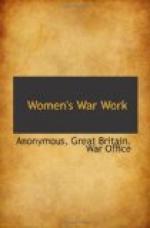Economists in peace time argue over what is termed “luxury” expenditure, the wasteful expenditure of peace. War expenditure may be correctly termed wasteful to a very great extent, and no country can carry both of these expenditures and remain solvent. Luxury expenditure should be entirely eliminated and the material and labour which was absorbed by it should go into the war. If this could be done completely, little damage would be done to the nation’s economic position. The thing to be clearly realized is that all the productive effort of the nation is needed for three things—the carrying on of the war—the production of necessaries and the manufacture of goods for export. Every civilian who uses material and labour unnecessarily makes these tasks harder and goes into the markets as an unfair competitor of the Government. Every man and woman who saves five dollars and lends it to their country give their country what is far more important than the five dollars. They transfer to the Government the five dollars worth of material and labour they could have used up if they had spent it on themselves and that is its real value. This means the needful purchases of the State are substituted for, instead of added to, the purchases of the civilian.
Further, the influence of economy in preventing undue inflation of currency and consequent high prices should be realized. A certain amount of high prices in war is inevitable but if civilians buy extravagantly, competition becomes intense and prices rise beyond all need. The supplies are limited—in our case that is greatly added to by the submarine menace—and the demands of the Government are enormous. The competition between the Government and the people grows more and more intense. Prices go still higher. The Government pays more than it should and so do the people. Higher wages are demanded with consequent higher prices, and so you get a vicious circle that gets more and more dangerous. If the civilian will relieve this pressure by demanding less, and cutting down his expenditure, prices will become more reasonable and the cost of the war less.
The chief difficulty in time of war is to make people realize the need of economy when they have, as our people have, more money than ever before, when enormous sums of money pour out ceaselessly to the people from the Government. They have to realize the fundamental difference between peace prosperity and war prosperity. Peace prosperity comes from the creation of wealth. War prosperity comes from the dissipation of wealth—the use of all resources—the pledging of credits. It is just as if we, as individuals, to meet a personal crisis, took all our personal savings and borrowed all we could and proceeded to spend it. The wise man or woman will save all of it they can and realize that every unnecessary dollar spent helps the enemy. No civilian in a struggle of this kind has any moral right to more than necessary things. We want every man and woman to have all they need for their efficiency. We would not say for one moment that every one can save, and money spent on clothing and feeding the children and keeping the home comfortable is well spent, but nothing should be wasted.




